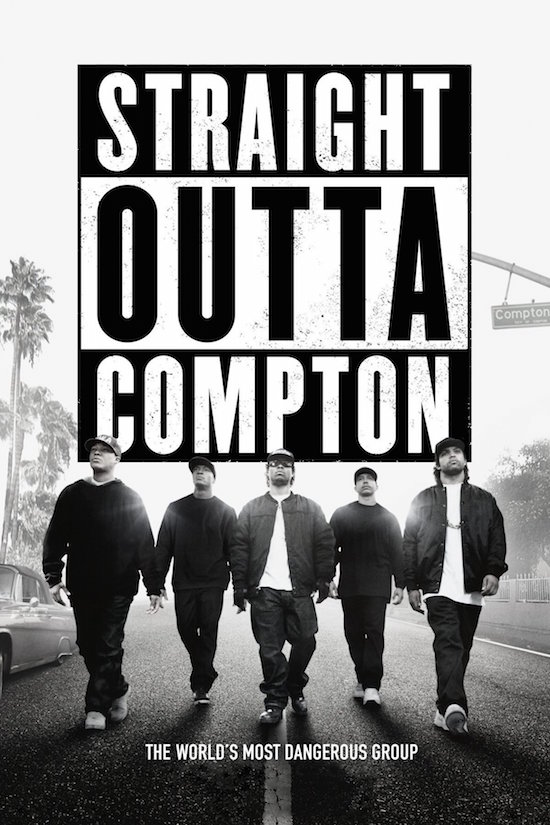I wasn’t sure what to expect going into this but the reviews had been good (Vern liked it) and I was interested in learning more about these influential hip hop artists. And, man, I really enjoyed this. I was riveted through a good portion of the film. The first half is especially compelling, tracking the early days of NWA, its rise to popularity, and the cracks that begin to grow in the group’s relationships. These scenes have so much energy to them, the actors perfectly embodying their characters, and the events are played in such a way that everything feels real.
Compton is shown as the dangerous place it was (and still is). We are truly rooting for these guys to rise above their circumstances and find success. There’s also an interesting parallel story showing the injustice the group has to suffer at the hands of the police. That theme dovetails perfectly with NWA’s famous song, “F*** tha Police”. You feel for these guys and understand a bit where their rage was coming from.
I have to give special mention to Ice Cube’s son O’Shea Jackson Jr. who plays his dad so perfectly, I had to do a double take in several scenes to believe it wasn’t actually Ice Cube. For a first time actor, he was absolutely amazing, bringing energy to every scene and surprising pathos in the quiet moments. Corey Hawkins as Dr. Dre did just as admirably, breaking through Dre’s typical shyness to show us a bit of what kind of man he is and why he did what he did. Jason Mitchell as Eazy-E had many great moments as well.
There’s a powerful moment in the film when the riots break out over the Rodney King verdict. The scene fits perfectly with the police issues and the lyrics that NWA was using in many of their most popular songs. At one point, we see Dre and Ice Cube driving through the riots, looking out their car windows in amazement. And kudos to the director for showing this in a way that hints that these artists, who had used extremely inciting language in their lyrics, maybe deep down, wonder if they had some small part in the destruction on those days. Certainly, they were not responsible for the riots but its played in just the right way to bring up a lot of questions.
The third act is a bit weaker as the story kind of loses its way, moving beyond the police brutality, the group’s struggle for success, the controversial music of NWA and instead, shows us a greatest hits of iconic moments and name drops. While I did enjoy seeing Snoop Dog’s first meeting with Dre and Suge Knight’s scary business dealings, the film stumbles in the conclusion. Entire plot lines such as Dre’s difficulties with his wife & kid, his arguments with his mother, his budding relationship with then girlfriend, and Ice Cube’s record label issues get swept aside with no satisfying ending in order to make way for an overly melodramatic showing of HIV infected Eazy E’s last days. It’s certainly not terrible by any stretch and there are many great moments but the ending is a bit striking in its lack of imagination compared to the absolutely brilliant first half.
Still, I’d highly recommend this to anyone that would like to know more about this turbulent time in the hip hop industry and what many of the most influential people of that music era went through to get their songs heard.
